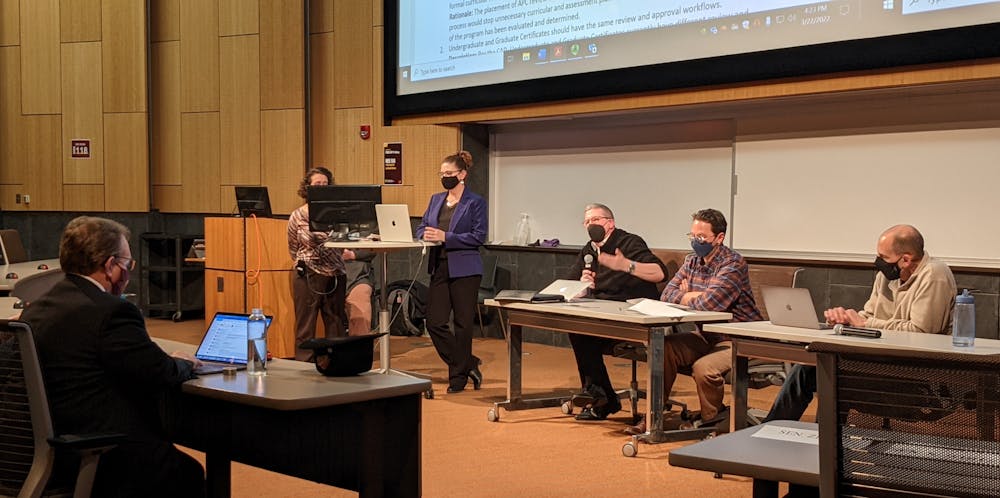Academic Senate discusses 'confusing' curriculum processes

The Academic Senate continued a discussion about Central Michigan University’s “confusing” process for curriculum changes at its bi-weekly Tuesday meeting on March 22.
An ongoing topic of discussion at senate meetings has been proposed changes to the Curricular Authority Document (CAD), which guides the process of changing or reviewing a program.
Since Fall 2021, the Curricular Process Review Committee (CPRC) has been trying to solve issues found in the CAD. The problems were found after new curriculum software required CMU to review it.
According to the CPRC’s list of recommended changes, using the CAD is “cumbersome” and the goal of the committee is to make it easier and less time-consuming for anyone involved in planning courses.
Members of the CPRC attended the meeting to answer senator questions, including Pete Ross, executive director of Curriculum and Instructional Support.
“At best, some of the CAD’s definitions, discussions and directions are a tad confusing,” Ross said. “At worst, they actually contradict themselves.”
Senate Chairperson Katrina Piatek-Jimenez, who is also a CPRC member, said some faculty have found “loopholes” to avoid the CAD’s procedures for creating new courses.
“I’ve heard faculty say, ‘well we’re going to create a brand-new course, but it’s easier to get through the curricular process if we just change everything on this old course that we never run anymore,’ which is kind of side-stepping the process,” Piatek-Jimenez said.
The senate’s discussion about the proposed changes is unfinished and did not end in a vote. The discussion will continue at future meetings.
Several other issues were also discussed at the senate’s meeting.
Presidential Assessment Survey
At the start of his report to the senate, President Bob Davies addressed a March 21 Central Michigan Life article that contained survey results assessing his leadership. The survey questions were copied from a survey created by the CMU Board of Trustees. CM Life’s survey received results nearly opposite to the board’s positive ones.
“I have always appreciated the efforts of CM Life to involve our community in various topics of discussion,” Davies said. “This is no different. I have been through the results of the survey with the same interest as my recent board assessment because community feedback is always important to me.
“Whether feedback is positive, neutral or negative, my interest is always on learning.”
Study abroad and travel
Interim Provost Richard Rothaus said — as of March 17 — 216 students have signed up for Summer 2022 study abroad programs. The number is lower than the typical, pre-pandemic 450-500 students, he said, but it is still something to celebrate after a hiatus of study abroad opportunities over the past two years.
CMU will continue to watch the war in Ukraine and COVID-19 conditions for student safety, Rothaus said. Study abroad programs will still require COVID-19 precautions. No programs have been canceled as of March 22.
Senator John Allen asked when faculty would regain control over their domestic travel programs. Rothaus said domestic travel had been restricted because of the pandemic.
Rothaus said he signed a memo an hour before the senate meeting eliminating the need for COVID-19 plans for domestic travel.
Mask policy
Some senators asked why CMU recently changed its masking policy. In a March 18 email to students, faculty and staff, Davies announced it is now optional to wear masks everywhere on campus except for classrooms, instructional spaces and areas required by state and federal health laws.
Davies said the new policy will stay in place “for the time being” and CMU will continue to monitor the pandemic to see if any more changes are needed. Senator John Allen asked why masks are optional in some indoor public spaces but not classrooms.
“One of the reasons,” Davies said, “is inside the classroom, the students and the faculty must be there, there’s really not an option if it is a face-to-face course and they will be in close proximity next to each other. We thought that was the safest way to approach. In other indoor areas, you are moving back and forth and also have a lot more options to be there or not to be there.”
Honors Program
Senator Joanne Dannenhoffer asked Davies when a report about changes in the Honors Program would be released.
In April 2021, Judy Idema was removed as associate director of the Honors Program, followed by protests from students who said her removal was “unjust.”
“11 months ago students raised concerns about what was happening in the Honors Program and a lack of communication about it from the administration,” Dannenhoffer said to Davies. “You were quoted in CM Life that you take comments from students seriously and would look into it. You were asked by senators three times in the Fall semester about the report recommendations and when you would share them."
“The last time, five months ago, you indicated you were finishing that process the following week, but we have heard nothing.”
Davies said the report has been delayed by individuals taking vacation time. He said the report should be given to the Honors Council before the end of the academic year.
Academic Senate meetings are held at 3:30 p.m. bi-weekly on Tuesdays in the French Auditorium. Livestream and recording links can be found on the senate website.



